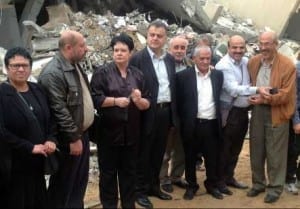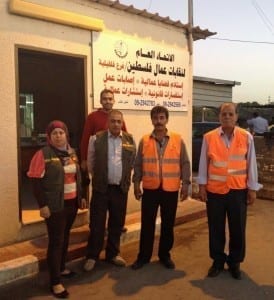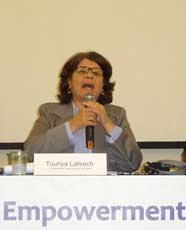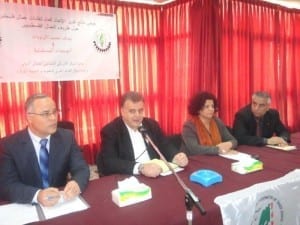Jul 23, 2014

ITF-affiliated bus drivers in Gaza are among workers affected by the current conflict. Credit: ITF
On an ordinary working day, activists from the Palestinian General Federation of Trade Unions (PGFTU)-Gaza conduct labor rights education and outreach to worksites around Gaza. In the past six months, Organizing Department Head Ahmad Hillis and other union officials have visited more than 180 workplaces including hospitals, pharmacies, universities and construction sites. (Arabic version of this article here.)
Through one-one-one conversations, the organizers have documented exchanges with 234 workers and informally registered 54 new union members. (PGFTU-Gaza is not currently able to maintain offices or collect membership fees.)
Today, as the fighting rages, the union’s outreach work is different. Trade unionists spend their days checking on other families and injured persons, talking with employees and owners of razed workplaces, trying to provide assistance where they can and helping to get people to United Nations agencies and aid organizations, where they can receive lifesaving and other assistance.
In coordination with PGFTU sisters and brothers in the West Bank, and with Solidarity Center staff and colleagues from across the international labor movement, the PGFTU has worked tirelessly to develop the federation’s role as a representative civil society organization with a truly national reach.
The brave and peaceful work of these unionists serves a social movement for greater equality and respect for human rights.
The institutions of the international trade union movement have been speaking publicly about the ongoing Palestinian/Israeli conflict. For more information:
Oct 30, 2013

Tamam Abdel Hafiz and co-workers at the Qalqilia border, where they talk with Palestinian workers. Credit: Francesca Ricciardone/Solidarity Center
By 4 a.m., Tamam Abdel Hafiz’s colleagues are already at the Qalqilia border crossing, talking with some of the more than 4,000 workers who head for jobs each day from Palestine to Israel and West Bank settlements. Hafiz and three other members of the organizing team of the Qalqilia branch of the Palestinian General Federation of Trade Unions (PGFTU) converse with workers all day and long after the border crossing closes at 7 p.m.
Some 10 percent of those who cross the border for work are women who toil in agriculture or as domestic workers. On average, they are paid around $40 per day, although the minimum daily wage under Israeli labor law is $56 per day. Because few decent work opportunities exist in the depressed Palestinian economy, many Palestinian women and men travel hours to access jobs in Israel, despite long queues at checkpoints, frequent harassment from soldiers and risk of injury or harassment inherent to informal employment environments.
Hafiz recalls a recent case of a woman fired from her agriculture job when the company changed ownership and the new owner refused to pay wages owed. Through PGFTU-Qalqilia efforts, the woman successfully claimed her wages from the employer and was placed in a new position.
Through round-the-clock support and an onsite office supported by the Solidarity Center, PGFTU organizers also provide workers with a variety of services, including job counseling; legal referrals for unpaid wages, medical treatment and employer reimbursement for workplace injuries; and education around labor rights.
Sep 27, 2013

Morocco union leader Touriya Lahrech will join women unionists at a gender equality conference in Casablanca. Credit Tula Connell/Solidarity Center
Nearly two dozen women trade unionists from Algeria, Egypt, Jordan, Tunisia and Palestine are set to meet next week for a unique skills-building and strategy conference in Casablanca, Morocco.
The Solidarity Center-sponsored Women’s Regional Advocacy Conference for the Middle East and North Africa region will bring together women leaders from seven union bodies to hone concrete skills, such as communications outreach and message development, and to support union-building initiatives that women leaders have identified as most important. Women representing the gamut of workers—from public sector employees to those toiling on farms—will share and learn strategies for strengthening women’s voices in their unions, their workplaces and in society.
The Sept. 30–Oct 1 conference continues the Solidarity Center’s series of trainings with union partners around the world. The Solidarity Center is committed to helping train women activists to become more effective advocates for gender equality at the bargaining table and within union structures.
In July, the Solidarity Center hosted more than 100 labor and community activists from 20 countries for the two-day conference, “Women’s Empowerment, Gender Equality and Labor Rights: Transforming the Terrain.” Touriya Lahrech was among those taking part, and she will welcome participants to the Casablanca conference. Lahrech is coordinator of the Women’s Department at the Confederation Democratique du Travail in Morocco.
Participating union bodies include: the Egyptian Democratic Labor Congress (EDLC); the Egyptian Federation of Independent Trade Unions (EFITU); the Federation of Independent Trade Unions of Jordan (FITU); the Palestinian General Federation of Trade Unions (PGFTU); Algeria’s SNAPAP; and the Union Générale Tunisienne de Travail (UGTT).
May 7, 2013

PGFTU leaders discussed the study, which found the majority of Palestinian workers are paid less than the minimum wage. Credit: Rami Khanfar
More than half of Palestinian workers—59 percent—earn less than the national minimum wage established in October 2012, and women workers are paid half as much as male wage earners, according to a new report. A large majority, 85 percent, of Palestinian workers do not have a written contract guaranteeing their conditions of employment.
“Palestinian Workers: A Comprehensive Report on Work Conditions, Priorities and Recommendations,” details the working conditions of Palestinians who labor in the West Bank, Gaza, Israel and Israeli settlements.. The report—based on surveys of workers in the West Bank, Gaza, Israel and the settlements—finds that fewer than half (47 percent) of working Palestinians have health insurance, while the majority (58 percent) say they risk physical hazards at work. The report is available in English and Arabic.
Many workers are required to work longer hours than those agreed upon and in excess of eight hours a day, with 17 percent of workers saying they are on the job seven days a week. Some 40 percent of workers say they work for more than eight hours a day and 10 percent say they work 12 hours a day.
According to one worker quoted anonymously in the report: “Employers do not abide by the terms of the contract with respect to working hours. For instance, workers in the construction sector work all day from 7 a.m. to 6 p.m.”
The report also highlights issues faced by women workers, only 12 percent of whom say their wages are sufficient to cover their living expenses. Women also face workplace abuse, such as in the Jordan Valley, where working women say they suffer beatings, verbal abuse and humiliation by labor brokers who bring workers to Israel.
“Palestine Workers,” based on interviews with 1,000 workers (union and non-union members), representatives from the Palestinian General Federation of Trade Unions (PGFTU), employers’ associations and government, officials, was prepared by the Arab World for Research and Development (AWRAD) with input from the PGFTU and support by the Solidarity Center
Jun 12, 2012
Poor education, poverty, and unemployment due to decades of occupation have pushed children in Palestine into the streets, where they beg passersby to purchase chewing gum, clothing, and other items. By raising awareness of this humanitarian crisis and pushing for better laws, the Palestine General Federation of Trade Unions (PGFTU) is part of the fight to end child labor and make sure children can stay in school. PGFTU recently published the stories of two children, Ahmed and Jarrah, in an effort to spread the word.
Ahmed: ‘I Will Not Leave School’
Ahmed (not his real name) stands at a traffic light in the cold, carrying packs of chewing gum in his little hands, knocking on the windows of the stopped cars in the hope that someone will buy the chewing gum he is selling. Some buy the gum, some reprimand him, and some ignore him. As a luxury car comes to a stop, he pleads with his eyes. The woman in the car condescends to him and buys a pack of gum, giving him 5 shekels (about $1). His face shows his delight at the generosity of this rich woman.
Ahmed is 14 years old. After his father died, as the oldest of four brothers, he had to take responsibility and help provide for his family. Although his mother receives a widow’s pension from the ministry of social affairs, it is not enough to support all of them in light of prohibitive prices, which increase day by day. “Almost every day, as soon as school ends, I go to the traffic light carrying gum to sell,” he says. “I spend three to four hours per day selling it and earn a maximum of 30 to 50 shekels ($6 to $10), which goes to help my family.”
Ahmed is focused on getting a good education, though. “I will not leave school,” he says, “but will work after school, and I will complete my education and enter university, and I will realize the dream of my father, with Allah’s mercy, and become an engineer.”
On the way to Nablus from Haifa Street, near the Mosque of Peace, the bearded Sheikh sees him selling the Quran—the little boy who jumps from one corner to another, chasing this car and that, trying to persuade passengers to buy a copy of the holy book, asking them how many shekels they can spare, begging them to take pity on a child who must earn a livelihood in this way.
Jarrah (not his real name) is 12 years old and lives in the Ein refugee camp, near Nablus. He has been selling the Quran for a year. Before that he sold clothes, he says, but people refused to buy them, so he switched to prayer papers, but the prayers were not popular either. “Then I was asked by a bearded young man living in the camp to sell Qurans for him for 5 shekels each, and he told me that he would give me a half-shekel for each Quran I sell,” says Jarrah. “The demand for the Quran is acceptable.”
Sometimes Jarrah does not succeed in the hunt for customers, and he must work for several additional hours, regardless of the harshness of the night or the cold of winter. He recognizes that selling in traffic scares him even more than the cold weather. Often he returns to his home at the camp with only a few shekels to spare for school expenses. Jarrah admits that most of the time he does not get home until after midnight and falls asleep before he can review his lessons for the next day. Because of this, he says, his grades at school are bad, but he has no choice: He must work to support himself and his family.




